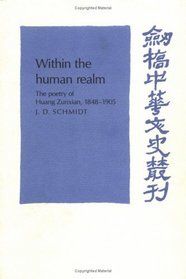Huang Zunxian (Huang Tsun-hsien) 1848-1905
A leading figure in the late Qing poetic revolution. Born into a Hakka family in Guangdong province, he developed an interest in foreigner cultures after trips to Hong Kong and Peking. He passed the Peking provincial examination in 1876 and served as a diplomat in Tokyo, and later in the U.S., London and Singapore. On his return to China, in 1894, he became deeply involved in the reformist movement. In his poetry he made major innovations in style. He believed that poetry could help to alter people's political awareness and he introduced much new and non-Chinese subject matter into his poems, often gleaned from his travels overseas, as well as writing many works which exposed the evils of society in 19th century China.
This book is a study of the poetry of Huang Zunxian, one of the most famous authors of late nineteenth-century China. The first part consists of a detailed biography outlining Huang's literary and political career. This is followed by a critical discussion of Huang's poetry, including such topics as his theory of literature, his traditional verse, his highly original poetry on foreign lands, his political satire, and his scientific verse. The book concludes with a generous sampling of his poetry in translation.
Preface; Part I. Biography: 1. The poet as a young man; 2. Huang, the diplomat; 3. Reform and reaction; Part II. Criticism: 4. The theory of the Poetic Revolution; 5. The practice of revolution; 6. Traditional themes; 7. Foreign climes; 8. The brave new world; 9. The development of Huang Zunxian's satire; 10. The late satirical poetry; 11. Huang Zunxian and modern science; 12. Quatrains of 1899; 13. Fin de siècle; Part III. Translations: 14. Early verse (ca. 1864–1868); 15. The growing talent (1868–1877); 16. Tokyo (1877–1882); 17. San Francisco (1882–1885); 18. Return to China (1885–1890); 19. The empire on which the sun never sets (1890–1892); 20. Singapore (1891–1894); 21. War and reform (1894–1899); 22. Retirement (1899–1905); Notes; Bibliography; Index.
